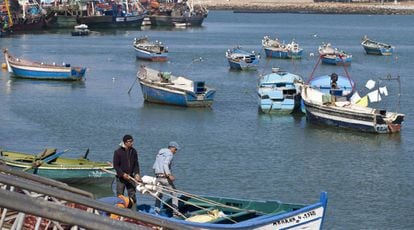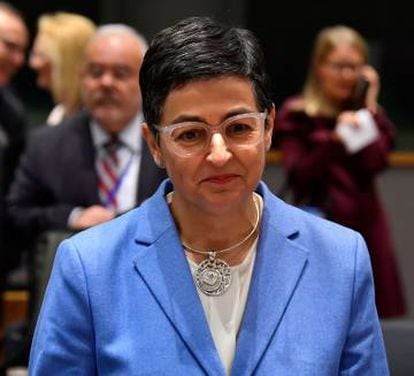
The Spanish foreign minister traveled to Morocco on Friday amid diplomatic tension over Rabat’s attempt to take control of waters near Spain’s Canary Islands.

Arancha González Laya was due to meet with her Moroccan counterpart, Nasser Bourita, to convey the message that there is no scope for unilateral action in the delimitation of territorial waters, a matter that should be resolved through agreements.
Although Rabat’s goal is to appropriate the waters off Western Sahara, a disputed territory that is partially occupied by Morocco and partly controlled by the self-proclaimed Sahrawi Arab Democratic Republic, the project could have an impact on Spanish waters around the Canary Islands, which lie in the Atlantic Ocean around 100 kilometers from the Moroccan coast.
González Laya, who was sworn into office last week, had originally been planning a trip to Rabat to discuss other issues such as immigration control and relations with the European Union.
But these plans have been altered by the Moroccan parliament’s recent approval of two bills establishing a maritime area where the north African country would have exclusive rights.
Tal y como hemos conversado con Marruecos en contactos estas últimas semanas no habrá política de hechos consumados ni acciones unilaterales
Así lo ha reiterado hoy el Ministro de Asuntos Exteriores de Marruecos Burita en la Cámara de Representantes@MAECgob @MarocDiplomatie
— Arancha González (@AranchaGlezLaya) January 22, 2020
“Just as we discussed with Morocco during these last few weeks there will be no facts-on-the-ground policies or unilateral actions. This has been underscored today by Moroccan Foreign Minister Bourita in the House of Representatives.”
These bills have no effect in terms of international law because they are not backed by the United Nations, but they are a message about Morocco’s intention to reinforce control over waters it claims as its own. Following their passage in the House of Representatives, they still need to be ratified by the Senate and signed by King Mohammed VI.
Valuable mineral
The bills set the maritime borders at 12 nautical miles off the coast of Western Sahara, a territory whose sovereignty remains in dispute after Spain withdrew in 1975. They also establish an exclusive economic zone of 200 nautical miles that could overlap with Canary Islands waters.
There is also overlap in the continental shelf of both countries at a spot where a 2016 expedition located the world’s largest known deposit of tellurium, one of the rarest minerals on Earth and of great use in technology to make solar panels and conductors for mobile devices. The site is located in an underwater volcanic mountain chain known as Tropic.
After her Rabat visit, the Spanish minister will visit the Canary Islands, where local authorities have expressed concern over Rabat’s intentions. On Saturday, González Laya is scheduled to meet with the regional leader of the archipelago, Ángel Víctor Torres.
English version by Susana Urra.
